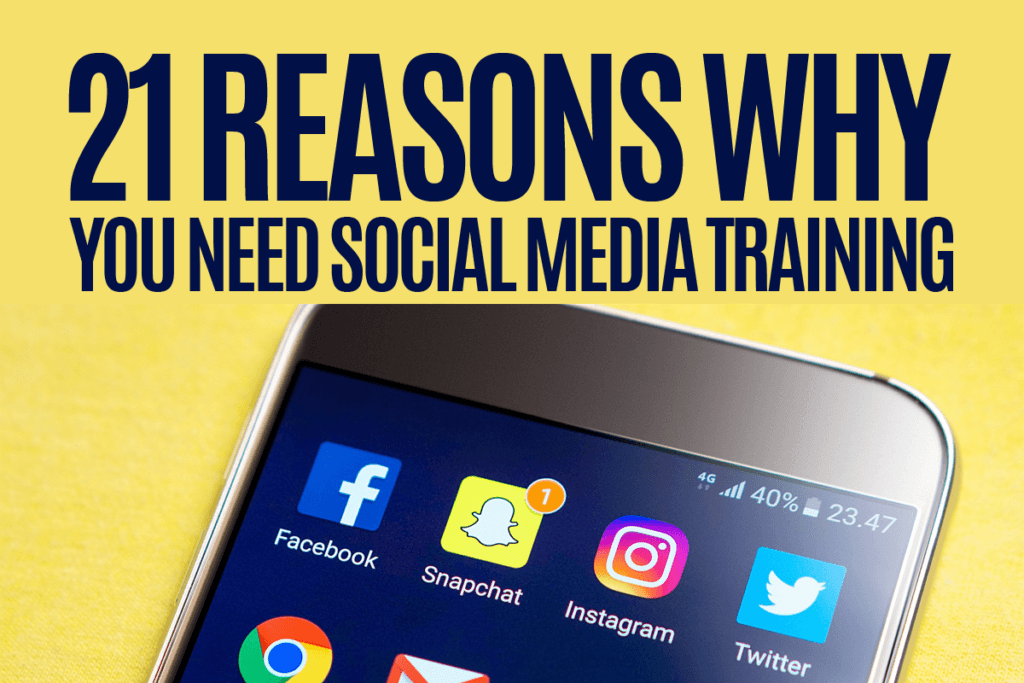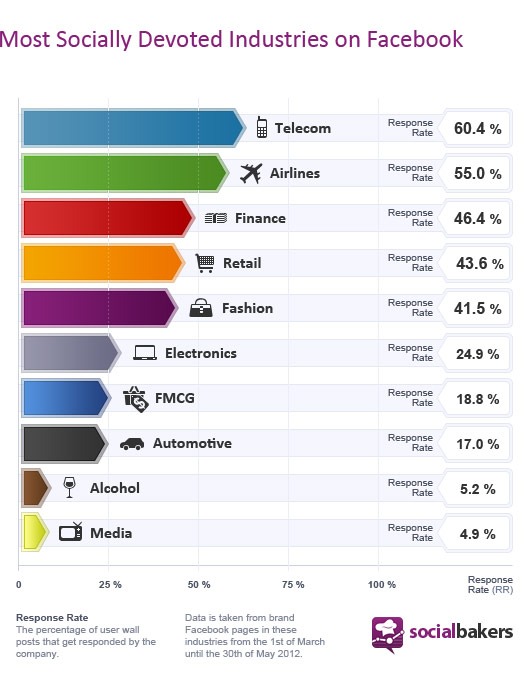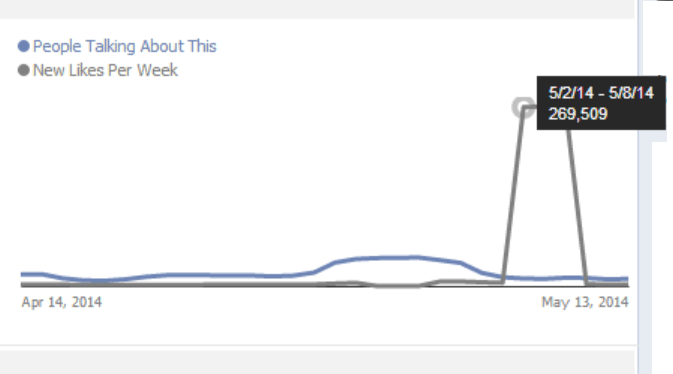Too many businesses unfortunately seem to think that they can simply delegate their social media marketing efforts to a young(ish) staff member and then walk away.
“After all,” they reason, “these people grew up on social media. They already connect with their friends through Facebook, Instagram, Snapchat and WhatsApp. Should be easy for them to run our social media marketing campaigns.”
Ummm, not so fast. Sure, it can work — but, far too often, it doesn’t.
Here, for your interest and edification, are 21 reasons why you and your team need training in the fine art of social media marketing:
First, as suggested by Business2Community:
1 Protect Your Brand
Training employees on the responsible use of social media protects the brand from employees sharing information (often unintentionally) that they shouldn’t have done about their work or the company.
2 Build Their Own Brand
If employees are able to build their personal brand online, they can establish themselves as thought leaders in a niche area that can help influence and educate potential buyers. By enabling employees to become ‘social’ with their own personal brand, you create a wealth of opportunities that you could only dream of with your brand channels.
3 Socially trained employees are more likely to share branded content
In my experience, when you educate employees on the importance of having a personal brand and building their network first, they are three times more likely to start sharing content than those that haven’t been given that context. By the time you introduce social sharing into the training model, employees will understand how this will impact their profile. They will have done the basic ‘profile’ updates. They’re in a place where they’re READY to start sharing and they know what to share, how often and to which channel. They are confident.
4 Socially trained employees will yield more impressions
Typically a trained employee will yield three times more social impressions per share than a non-trained employee and this is mainly because they have invested time in building their network first. I always emphasise the importance of building and nurturing a strong network around your personal brand. Once you’ve achieved this you’re ready to start sharing. For example, it makes no sense to jump into sharing content if you’re only connected to 20 people on LinkedIn.
5 Socially trained employees will increase your engagements
Naturally, if you’re gaining more impressions you will attract more engagements including likes, comments and shares. I’ve found that trained employees will generate anywhere between 30-50% more engagements than non-trained employees and this is because they know what kind of content works well on which network. They know how to encourage engagement.
6 Socially trained employees will generate more clicks
Marketing will understand the importance of this one because in the paid media world, every click costs dollars. In my experience, employees who share content generated 50% more clicks than when I shared the same piece of content via branded social channels. WOW!
Employees who were social media trained generated twice the amount of clicks than employees who weren’t trained.
This has a lot to do with making sure that the content is relevant for the employee’s personal brand and that it’s good content. Well written, full of useful insights and easy to read. Poor content won’t fly with your employees…or on any social channel for that matter.
PRSay adds several more:
7. Social media is a team sport
On social media, reach is a factor of engagement. The more people like, comment, retweet and +1 a share on a social network, the broader and further it travels. Posts that attract the most engagement are also the most visible. When someone interacts with a post on a social network, they do so in front of their online friends. If any of their friends engage, that message gets passed along. If you train the whole company and teach how to engage in company communications, the result is social media marketing at scale.
8. Policy isn’t enough
A social media policy is a critical component of any social media strategy. However, a policy only provides value if people actually read and understand it. “Probably as important as the policy itself is the training and the guidance that you give people around the policy. The best policy in the world is kind of useless if it sits on a shelf or it’s on your intranet and either people don’t look at it or really understand the nuances,” Daniel M. Goldman, general counsel at the Mayo Clinic, pointed out recently.
9. Official channels are less trusted
As much as digital natives have the impulse to share, most organizations have the impulse to channel communications through a public relations representative or their leadership. Now that everyone’s on social media, that strategy doesn’t work as well. Here’s why: there’s an increasingly wide gap between the degree of trust we have in institutions versus their leadership. It’s even wider for government than it is for business, and it shows that relying exclusively on CEOs and official spokespeople for external communications is a losing strategy. We trust subject matter experts more than the PR of the C-suite, research shows.
10. Industry leaders are tech savvy
Digital leaders in business outperform their peers in every industry. Businesses that invest in technology-enabled customer engagement and internal operations initiatives are, on average, 26 percent more profitable, and enjoy 12 percent higher market valuations, says a new report from CapGemini and MIT. Given the ease with which it enables collaboration, social media has the potential to supercharge customer and employee communications.
11. Training helps minimize employee turnover
Over the last two years, nearly half of all employers have had to deal with the misuse of social media by employees (or former employees). During that same period, nearly half of all employers have allowed access to social media sites at work, and these numbers are steadily rising. But less than one-third actually train personnel on the responsible use of social media at work, according to a recent report by Proskauer International. Providing access to social networks in the workplace without offering social media training is an ineffective way to achieve compliance.
Your colleagues are already using social media in the workplace to stay current on industry trends, collaborate with their coworkers, and to source and procure suppliers and service providers. Search tools and social media make it easier for them to get their jobs done. Why wouldn’t they take the shortest path to achieving their objective, and why wouldn’t you encourage them to do so? Remember, the by-product of all those online discussions is an arsenal of tweets, status updates and posts that become a trail of digital bread crumbs that lead back to you.
And Half a Bubble Out supplies four more:
12 Understanding Platforms
One thing that most people don’t understand is that there is a difference between business social media accounts and personal social media accounts. The back end looks different and the setup process is different as well. For people who aren’t trained or don’t have any experience with social media business pages, understanding this can be confusing. Since platforms constantly have updates and changes, business accounts need to be constantly monitored, have a strategy, have a planned message and be deliberate.
13 Strategizing for Goals
One of the best ways to improve your social media efforts is to strategize your message and actions before you do it. Then you can analyze the success of the strategy and make improvements from there. But everything that you do on social media should have a purpose. You might not have thought that social media training would include strategy, but this is important to an excellent social media presence.
14 Creating Relationships
Social media is great for creating engagement, and also for nurturing relationships on the different networks. These platforms can help build trust and credibility when you share helpful and relevant content to your followers. And most of your conversations are public, so how you handle situations and comments can speak loudly for your business.
15 Abiding by Guidelines
Every company should have specific social media guidelines so the expectations are clear. If you have a light-hearted audience, then posting a picture of our employees enjoying a glass of wine to celebrate the week might be appropriate. But this might not be appropriate for all businesses. Training your employees to use their best judgement and following these guidelines is crucial to keep the integrity of your brand.
Oh, and here are another half-dozen reasons that we wrote about, back in the day:
Social Media Warning Signs
Get yourself social media training fast if your business makes any of these mistakes:
16 Getting into an argument and insulting your customers and followers
It was the customer service disaster heard around the Internet. An Arizona restaurateur, fed up after years of negative online reviews and an embarrassing appearance on a reality television show, posted a social media rant laced with salty language and angry, uppercase letters that quickly went viral, to the delight of people who love a good Internet meltdown.
17 Not replying to questions and comments on your social media platforms.
Too many brands simply ignore what’s being said to them, with entirely predictable results. This graph from SocialBakers shows which industries are the best (and worst) at responding:
18 All you talk about in social media is yourself
Only 10% of what you talk about in social media should be yourself and your own products or services. The rest of your discussions should be about things that matter to your followers. Don’t be like this Donut shop, constantly posting meaningless pictures of donuts and drinks to an audience that couldn’t care less (3416 followers but less than a dozen likes per image).
19 Nobody’s talking about you
As you may have heard, Facebook has dialled back its organic reach. What that means, in a nutshell, is that even if someone likes your Facebook brand page, it’s most unlikely that they will see your posts in their newsfeed. That means, to all intents and purposes, that you’re invisible to your followers — unless (a) you promote your posts to them; or (b) you write posts that are sufficiently interesting and engaging that they get shared by the few that do see them (and thus get out to a wider audience).
The Star Wars page on Facebook, for example, despite 11 million followers, was only averaging around 15,000 weekly talks — until May the Fourth (“be with you”), when interest surged and more than a quarter of a million people found Star Wars worth talking about again on Facebook.
20 Everybody’s talking about you (but not in a good way)
Justine Sacco, head of public relations for UK media giant IAC, flew towards Africa one day, blissfully unaware of the uproar caused by her final tweet before boarding her 12-hour flight.
Even though Ms Sacco had a mere 200 followers, the tweet went viral even while she was flying. Her tweet was universally condemned as racist, resulting in the hashtag #HasJustineLandedYet trending worldwide. Unsurprisingly, Ms Sacco lost her job, her former employer apologised profusely and several AIDS charities received donations from appalled twitterati.
21 You post too often (or too seldom)
How often should you post to your social networks? That depends on (a) your networks; and (b) your followers.
If you’re posting to Twitter, for example, and reaching out to a business audience, then posting (variations on the same information) at three-hour intervals during the business day is acceptable — very few will see more than one post, given the transient nature of Twitter.
On the other hand, posting to a consumer audience via Facebook should be less frequent, because posts are likely to linger more there. Take a look at your Facebook page Insights data and view “When Your Fans Are Online”.
Post perhaps twice a day, at times that coincide with most of your fans being online.
Once you realise you need Social Media Training
Need training? We would be remiss if we didn’t point you to our range of online training courses, covering Social Media Marketing and other digital marketing topics:
Social Media Marketing
If you would like to know more about the full range of Social Media marketing options available to Kiwi businesses, check out our Social Media Marketing course:
The Principles & Practice of Social Media Marketing
This is a thirteen-part eCourse providing a comprehensive introduction to Social Media Marketing, from the Basics to detailed instructions on how to build and run a Social Media Marketing programme.
For more details of the Social Media Marketing online course, please click here.
So you have a few hundred (or a few thousand) followers on Facebook but now you want to know how to get to the next level? Our Facebook Accelerator seven-part online course will lead you through the steps necessary to supercharge your Facebook presence and get Kiwi consumers engaging with you and your brands.
For more details of the Facebook Accelerator programme, please click here.
For those who wish to master Facebook Marketing in its entirety, we’ve created a ten-week online training programme which will take you from absolute beginner on Facebook to highly effective Facebook communicator.
For more details of the Complete Facebook Marketing programme, please click here.
Mastering Facebook Advertising
This is a nine-part eCourse providing a comprehensive introduction to paid Facebook Advertising.
For more details of the Mastering Facebook Ads online training course, please click here.
Instagram Marketing course
If your target audience is Under 35, Instagram absolutely must be one of your marketing options. This course will give you a solid introduction to this fast-growing social medium.
Even if you don’t intend to become directly involved in social media yourself, you may still need to understand the principles, practices and opportunities of social media — for example, if you need to brief someone about running a social media campaign. This programme is designed to provide you with the insights necessary to prepare an effective brief.
For more details of the How to Prepare an Effective Social Media Brief programme, please click here.
How to Use LinkedIn Effectively – For Your Business And Your Career

This is a seven-part online training eCourse providing a comprehensive introduction to LinkedIn, from the basics to detailed instructions on how to use LinkedIn to promote your organisation, build your personal reputation, find a job, recruit prospective employees and even make sales.
For more details of the How to Use LinkedIn Effectively programme, please click here.

Online Video is no longer an “up-and-coming” marketing tactic — it’s here, and it’s a powerful way to communicate your brand story, explain your value proposition, and build relationships with your customers and prospects.
It’s well past time for you to upskill yourself in online video marketing, with our seven week course on Online Video Marketing. For more details, please click here.
Advanced Digital Marketing
This brand new, hot-off-the-virtual-presses 13-part course is dedicated to delivering the very latest information about Digital Marketing. It is freshly developed in 2019 and will be revised and updated throughout the year.

For more details about the Advanced Digital Marketing course, see https://socialmedia.org.nz/ecourses/advanced-digital-marketing/
Digital Marketing 101
Digital Marketing 101 is a 26-part online training course designed for students who may know very little about Digital Marketing, touching on a wide range of Digital Marketing topics over a six-month period.
For more information about Digital Marketing 101, please click here.
Influencer Marketing course

Our Influencer Marketing online training course is a nine-part course which covers the importance of Influencer Marketing, helps you to determine the smartest and most effective strategies — and to explore how to identify effective Kiwi micro-influencers who will be good ambassadors for your brand.
For more information about our Influencer Marketing course, please click here.
Writing for the Web course

Effective writing has become an absolutely core competency when communicating online. Not just any writing, however. Different media require different approaches. The headline that might have looked wonderful in the newspaper probably won’t fit within the constraints of Facebook or Instagram character counts.
Our Writing for the Web course covers the key elements you need to know to communicate effectively to online audiences.
For more information about our Writing for the Web course, please click here.
Mastering eCommerce
Our online course, “Mastering eCommerce”, tells you what you need to know about selling effectively online in a seven-week programme that steps you through the principles and practices of eCommerce in New Zealand.
For more details of the Mastering eCommerce programme, please click here.















